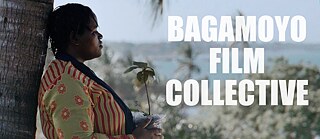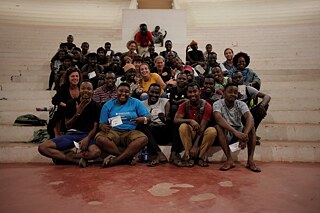Bagamoyo Film Collective (bafico)

Bagamoyo Film Collective
Today, BaFiCo is a growing platform for young theater, art, and filmmakers who aim to initiate and professionalize their own projects. The collective's works have been exhibited in public settings, civil society organizations, universities, and international film festivals.
Since its inception, the Goethe-Institute Dar Es Salaam has been a close partner of BaFiCo, providing financial support. Currently, the collective is working on three themes:
Shared History
Tanzania and Germany share a colonial history that needs to be collectively addressed through dialogue. By taking this into account, BaFiCo is currently working on the audiovisual project Kilichobaki, which focuses on oral history in Northern Tanzania. Kilichobaki is a collaborative project between German and Tanzanian artists that began in August 2022. Its main goal is to amplify local and activist perspectives on the repatriation of colonial objects. The project is in partnership with the Marajesho exhibition, currently being held at the Tieranatomisches Theater in Berlin. In 2022, the Marajesho exhibition, which means "return" or "restitution" in Swahili, traveled to six villages around Kilimanjaro and Meru as a mobile research exhibition. Its purpose was to facilitate the exchange of knowledge and bridge the gap between German museums and local communities. The exhibition featured stolen cultural objects from the region, historical photos, and information about collections of objects and human remains. Out of this collaboration BaFiCo works on the three following areas:Kilichobaki: What Remains – Documentary
Reflections:
Reflecting on the production and hosting of the Marejesho exhibition, where bafico not only showcases the entire process in the upcoming documentary Kilichobaki, but also records oral history interviews during the exhibition, which immediately become part of the exhibition itself.
In the following interview excerpts, Konradin Kunze, Gabriel Mzei Orio, and Mnyaka Sururu Mboro discuss their motivations for creating the Marejesho exhibition. They share how they initially connected, their underlying motivations, and their future outlook regarding the restitution of stolen artifacts. Additionally, we look forward to conducting an interview with curator Sarita Mamseri in the near future.
Featuring:
Gabriel Mzei Orio (TZ) - Old Moshi Cultural Tourism
Mnyaka Sururu Mboro (D/TZ) - Berlin Postkolonial
https://www.berlin-postkolonial.de/
Konradin Kunze (D) - Flinn Works
https://flinnworks.de/
Filmic commentaries:
Based on the film material collected for the documentary Kilichobaki, the Bagamoyo Film Collective conducted a workshop on "Colonial Footprints" at TaSuBa College in March 2023. Students engaged with the documented oral history and created three cinematic commentaries on these filmic artifacts. The films were showcased at an open-air event at TaSUBa College and screened during a student gathering for further discussion.
Shared Filmmaking
We believe that Shared filmmaking stands for collaborative creative work. These films were created in three consecutive 10-day film workshops with students from the TaSuBa College Bagamoyo. The workshops followed this collaborative approach to film production, with shared decision-making. Participants from various college departments worked together on aspects such as scriptwriting, directing, producing, cinematography, and editing. Divers stories were shared and further developed through group discussions. Dialogues were developed on set, based on a flexible story script. This approach aims to showcase multiple perspectives and voices, fostering a more inclusive and community-driven representation.Shared Perspectives
In our growing network of creatives, we are primary interested in sharing perspectives. Joint projects are usually developed through these shared perspectives."Letters from Somewhere" is both a grant program and a web series. Similar to the letters that were once sent, today we invite young filmmakers to send us short film ideas. The collective gives a grant of 100 euros to the selected ones. Through this small grant, our goal is to inspire and assist young filmmakers in discovering their unique cinematic voice. We aspire to build a continuously expanding film archive that embraces a variety of voices and multiple perspectives in cinematic storytelling.
Our projects have been presented in various contexts.
Film festivals: Several films from the collective have been selected and screened at various film festivals around the globe, including Tanzania, South Africa, Kenya, Nigeria, USA, UK, India, and Germany. The film Hatua kwa Hatua won two prizes at the Retro Avant Garde Film Festival (RAGAFF) in Cairo.
Academic settings, such as discussion and feedback rounds, film screenings, anthropological film festivals, and workshops, especially in Europe and Tanzania.
Non-governmental settings (NGOs): The collective has worked and presented their works at several NGO settings.
bafico has cooperated and/or been funded by several institutions, such as TaSuBa College, Freie Universität Berlin, Heinrich-Böll-Stiftung, flinnworks, kijiweni productions, mauerpark institute, Brot für die Welt, filmarche, and many more.
The Goethe-Institute Tanzania has been a supporter of the collective since its existence.
Further infos are found on the homepage of bafico: www.bafico.org

bafico team and workshop participants 2017, production of the shortfilm tabia. | © bafico